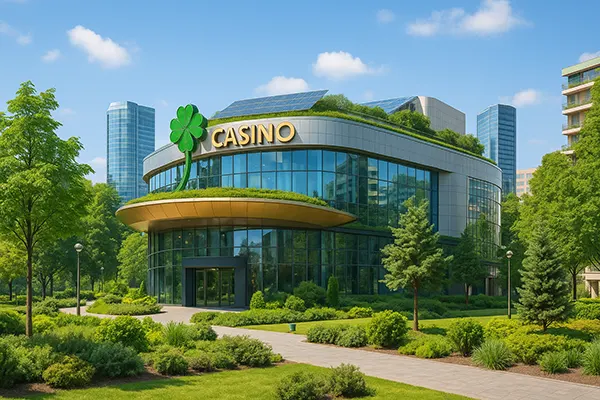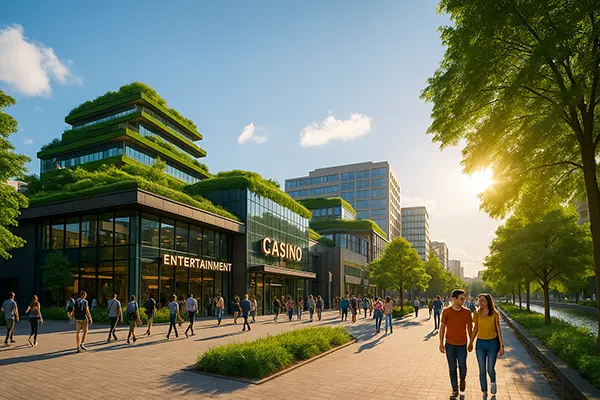
Ecology of the Gambling Industry: The Impact of Casinos and Betting on Cities and Local Communities
The gambling industry continues to expand globally, influencing economies, cities, and local communities. However, this growth comes with environmental and social consequences that require serious consideration. In 2025, sustainable development has become a key priority for the sector, as stakeholders recognise the importance of minimising ecological harm and supporting social responsibility.
Environmental Footprint of Modern Casinos
Casinos, hotels, and entertainment complexes consume enormous amounts of electricity, water, and natural resources. Continuous lighting, climate control, and digital infrastructure all contribute to significant carbon emissions. According to 2025 studies by environmental agencies in the UK and the EU, a single large casino can emit up to 20,000 tonnes of CO₂ annually, comparable to the output of several thousand households.
Water usage is another serious issue. Resort-based casinos in hot regions like Nevada or Macau rely on cooling systems, fountains, and landscaping that demand millions of litres of water each year. This overuse places pressure on already strained water supplies and accelerates desertification in nearby areas.
To address these challenges, operators are investing in green technologies. Many establishments have switched to LED lighting, introduced smart ventilation systems, and installed solar panels to reduce dependence on non-renewable energy. The European Casino Association also promotes energy audits and sustainability certifications for licensed operators.
Implementing Sustainable Practices in Casino Operations
In 2025, sustainability is no longer an option but an operational requirement for major gambling companies. Many venues have adopted zero-waste policies and developed internal programmes for recycling, food waste reduction, and eco-friendly cleaning products. Casinos in Scandinavia and Western Europe have taken the lead, integrating circular economy principles into their daily management.
Online gambling companies are also making environmental adjustments. Data centres that power gaming servers now use renewable energy sources and advanced cooling systems to reduce carbon output. This approach reflects a broader shift in digital industries toward carbon neutrality.
Environmental reporting has become a transparency standard. Operators are expected to publish annual sustainability reports, outlining progress in reducing emissions, energy consumption, and waste. These efforts demonstrate accountability and build trust with environmentally conscious players and investors.
Social Impact on Local Communities
The expansion of casinos brings both opportunities and challenges for local populations. Economically, gambling establishments generate employment, tourism revenue, and tax income that support public infrastructure projects. In the United Kingdom, for instance, the gambling sector contributes billions of pounds to the Treasury every year.
However, the social cost cannot be ignored. Problem gambling, addiction, and associated mental health issues remain serious public concerns. In response, 2025 policies by the UK Gambling Commission and the European Gaming and Betting Association (EGBA) emphasise responsible gambling frameworks, funding for counselling services, and public awareness campaigns.
Community relations are also a critical factor. Successful operators collaborate with local authorities, charities, and educational institutions to mitigate negative impacts. These partnerships aim to create safer environments and ensure that gambling contributes positively to urban life rather than destabilising it.
Corporate Responsibility and Community Engagement
Corporate social responsibility (CSR) initiatives have become an integral part of casino strategy. Operators now allocate a portion of profits to social programmes supporting education, healthcare, and addiction prevention. Transparency and ethical leadership play a vital role in maintaining community trust.
Local collaboration extends to cultural and recreational projects. Many casino groups sponsor museums, music events, and youth sports activities, helping revitalise regions affected by unemployment or economic stagnation. Such programmes also diversify the image of gambling venues, presenting them as contributors to community welfare.
At the same time, regulatory oversight ensures accountability. Governments in 2025 are tightening environmental and social standards for casino licensing. This includes mandatory audits on CSR spending and environmental compliance to ensure consistent and measurable results.

Urban Development and Environmental Balance
Casinos influence the physical and social landscape of cities. Urban planners often see them as catalysts for regeneration, driving investment and infrastructure development. However, uncontrolled expansion can disrupt local ecosystems, increase traffic congestion, and raise property prices beyond the reach of residents.
Modern architectural practices aim to counteract these effects. Many new projects follow green building standards such as BREEAM and LEED, incorporating renewable materials, efficient insulation, and natural ventilation. In 2025, integrated urban planning ensures that casino zones coexist with public spaces, green parks, and sustainable transport networks.
Tourism-based cities are especially sensitive to the environmental balance. Excessive nightlife, noise pollution, and waste production challenge local authorities to introduce stricter environmental controls. Success stories from places like Monaco and Copenhagen show that environmentally regulated gambling tourism can coexist with ecological priorities.
The Future of Eco-Friendly Gambling Infrastructure
Looking ahead, the gambling industry’s future lies in ecological innovation. Smart technology allows real-time monitoring of energy consumption, while AI-driven analytics optimise water and power usage. Digital gambling also reduces the environmental impact associated with travel and construction of new venues.
Governments and industry bodies are expected to establish stricter environmental criteria for licensing. These will include mandatory carbon assessments and sustainability milestones. The European Union’s Green Deal already influences casino design and operation across member states, promoting long-term environmental accountability.
Ultimately, the transition towards eco-friendly gambling is a shared responsibility. Operators, regulators, and players all play a role in building a sustainable future for entertainment. Environmental awareness, combined with ethical business conduct, will define the industry’s reputation and longevity in the years ahead.
Similar articles
-
 Cascading Wins: Why Winning Stre...
Cascading Wins: Why Winning Stre...Anyone who has spent time in a casino, whether online or land-based, has …
-
 Should you play a slot demo to t...
Should you play a slot demo to t...Demo mode is a useful way to understand how a slot works without …
-
 Optimal Bet Size for a Long Sess...
Optimal Bet Size for a Long Sess...Long casino sessions are rarely lost because of one “bad beat”. More often, …
-
 Why Card Counting Appears More E...
Why Card Counting Appears More E...Card counting has long been associated with an image of control, logic, and …
